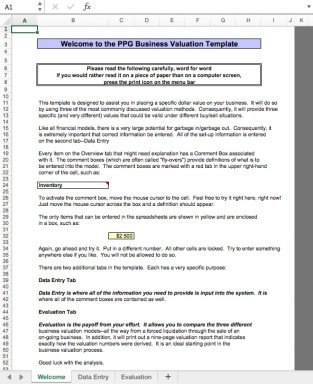
Originally published: 15/11/2016 10:50
Publication number: ELQ-93939-1
View all versions & Certificate
Publication number: ELQ-93939-1
View all versions & Certificate

Business Valuation Template
Determine the value of your firm using three methods to use in different buy/sell situations
acquisitionfinancevaluationprivate equitynet asset valuediscounted future earningsassets and earningsprivate firms
Description
At various times privately held firms face the need to put a monetary value on the business. This need may arise due to an impending merger or acquisition, a need for additional private financing, the establishment of an employee stock ownership program (ESOP), a need to define management succession, or family issues such as death or divorce.
Determining the exact value of a private firm is a complex task which involves the appraisal of assets, reviewing the level of management salaries and the close examination of any transactions between the company and its owners. Eventually, valuing a private firm also involves a large degree of negotiation.
This discussion is intended to provide management with a starting point in determining the value of the firm. Any definitive valuation would require a careful review by a qualified appraisal expert. However, some reasonable estimates can be made based upon the fact that in almost all valuation systems, market value is influenced by two key factors:
1. The net value of the assets after paying all debtors.
2. The current value of anticipated future earnings from the business.
These factors can be evaluated either individually or in combination. This report will examine three specific methods of valuation that combine the two factors:
1. Net Asset Value--Focusing exclusively on the asset base of the firm. Typically, this model will produce the lowest valuation.
2. Discounted Future Earnings--Focusing exclusively on the earnings potential of the firm. In most, but not all cases, this approach will produce the highest valuation.
3. Assets and Earnings--Combining the two previous models in an attempt to find some mid-range valuation point.
This template is designed to assist you in placing a specific dollar value on your business. It will do so by using these three most commonly discussed valuation methods. Consequently, it will provide three specific (and very different) values that could be valid under different buy/sell situations.
Note: The selling price of a business is inevitably determined by intensive negotiation between an informed buyer and an informed seller. This template is in no way intended as a replacement for that negotiation activity. It is simply a tool to provide a starting point in your business valuation process. Don't make it a substitute for judgment.
At various times privately held firms face the need to put a monetary value on the business. This need may arise due to an impending merger or acquisition, a need for additional private financing, the establishment of an employee stock ownership program (ESOP), a need to define management succession, or family issues such as death or divorce.
Determining the exact value of a private firm is a complex task which involves the appraisal of assets, reviewing the level of management salaries and the close examination of any transactions between the company and its owners. Eventually, valuing a private firm also involves a large degree of negotiation.
This discussion is intended to provide management with a starting point in determining the value of the firm. Any definitive valuation would require a careful review by a qualified appraisal expert. However, some reasonable estimates can be made based upon the fact that in almost all valuation systems, market value is influenced by two key factors:
1. The net value of the assets after paying all debtors.
2. The current value of anticipated future earnings from the business.
These factors can be evaluated either individually or in combination. This report will examine three specific methods of valuation that combine the two factors:
1. Net Asset Value--Focusing exclusively on the asset base of the firm. Typically, this model will produce the lowest valuation.
2. Discounted Future Earnings--Focusing exclusively on the earnings potential of the firm. In most, but not all cases, this approach will produce the highest valuation.
3. Assets and Earnings--Combining the two previous models in an attempt to find some mid-range valuation point.
This template is designed to assist you in placing a specific dollar value on your business. It will do so by using these three most commonly discussed valuation methods. Consequently, it will provide three specific (and very different) values that could be valid under different buy/sell situations.
Note: The selling price of a business is inevitably determined by intensive negotiation between an informed buyer and an informed seller. This template is in no way intended as a replacement for that negotiation activity. It is simply a tool to provide a starting point in your business valuation process. Don't make it a substitute for judgment.
This Best Practice includes
1 Excel Model














